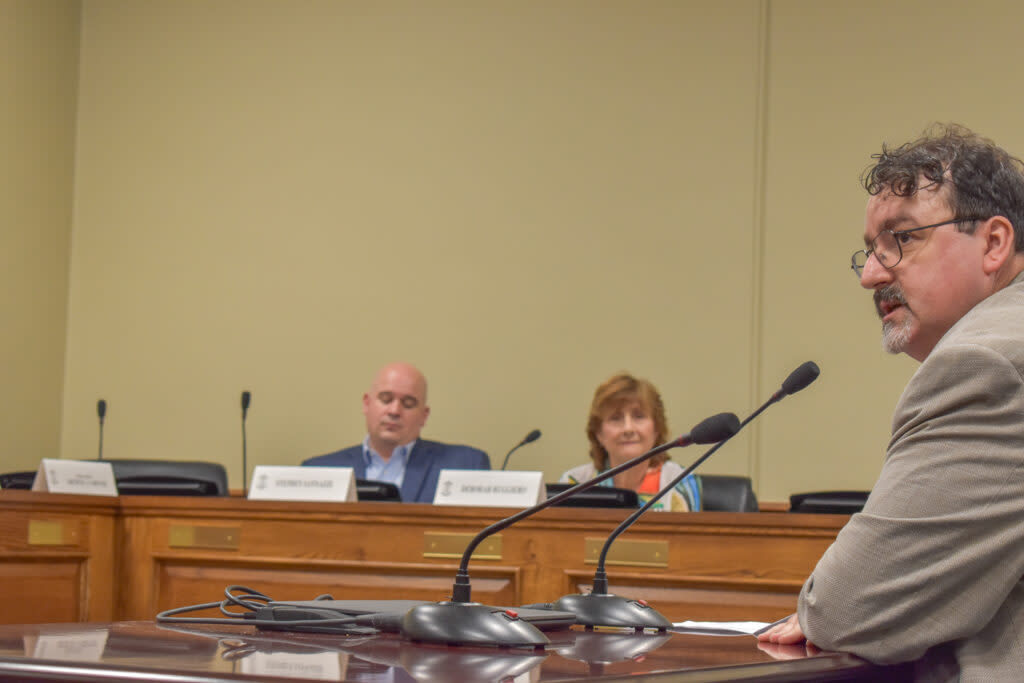Proponents from both ends of political spectrum see wisdom of holding constitutional convention

Cranston resident Steve Frias, the former Rhode Island Republican National Committeeman and a member of the 2014 preparatory commission for a constitutional convention, speaks in favor of a ballot question asking Rhode Island voters if the state should hold such a convention during a meeting on Tuesday, July 30, 2024. (Christopher Shea/Rhode Island Current)
A week after a coalition of labor and civil rights groups came out against holding a constitutional convention, proponents made their case Tuesday for why Rhode Island voters should approve the once-in-a-decade opportunity to take a fresh look at the state’s governing document.
“A constitutional convention is an opportunity to change how Rhode Island is run,” former Rhode Island Republican National Committeeman Steve Frias told the legislative panel laying the groundwork for ballot measure Tuesday. “If you’re happy with how things are going: Vote no. If you think we can do better: Vote yes.”
Frias was one of six people who spoke before the panel tasked with gathering public input to prepare a report on the possibilities for what should be included in a voter handbook mailed to all registered voters before the Nov. 5 election. The commission must complete its report by Sept. 1.
Frias served on the commission formed in 2014, the year 55% of Rhode Island voters rejected a question on the ballot asking if the state should hold a constitutional convention.
A convention question typically goes on the ballot in years ending in the number four. Voters also rejected ballot questions seeking to convene one in 1994 and 2004. The most recent convention was held in 1986 — the last of any state in the nation.
The General Assembly may propose amendments during any election year — which includes reforms such as the separation of powers in 2004, making legislators subject to Ethics Commission investigations in 2016, and the removal of “Providence Plantations” from the state’s official name in 2020.
A primary reason to hold a convention, Sen. Sam Zurier, a Providence Democrat, told the 12-member commission that very few proposed amendments actually make it out of Smith Hill and onto the ballot. That includes Zurier’s push for making the right to an education enshrined in the state’s constitution, a proposal the Rhode Island Senate has approved in recent years only to see it stall in the House.
“I don’t see a path for that to be approved other than a constitutional convention,” Zurier said.
Similarly, Frias said a convention may be the only way the state can establish an independent inspector general’s office — something Rhode Island Republicans have sought for the past two decades. Lawmakers tried to add the position in the fiscal year 2025 budget, but the push was rejected by the House on June 7.
“If we had an inspector general like others states — we could have caught what was going wrong with that bridge,” he said, referring to the shuttered westbound Washington Bridge. The independent legal team hired by Gov. Dan McKee’s administration to help build the state’s case against those at fault for December’s emergency closure said a lawsuit is likely to be filed early August.
Other reforms that could be taken up at a constitutional convention include citizen ballot initiatives, same-day voter registration, and non-plurality voting, proponents said.
IndependentVoting.org advocate Elaina Goldstein told the commission she would like to see a constitutional amendment shifting Rhode Island’s partisan primary elections to a single open election that all candidates and all voters could participate in.
Goldstein said that as an unaffiliated voter herself, the system now in place restricts the choices available to voters.
“This becomes problematic when multiple candidates are running in the Democratic primary for Congress, and at the same time, multiple candidates are running in the Republican primary for governor,” she said.
How much to convene?
Over the past few decades, commission reports have focused too much on the potential cost of holding conventions. That’s why Frias asked the commission to refrain from including the potential price tag this go-around for a 2026 convention.
When the last convention was held in 1986, the final tab was $891,000 — or roughly $2.6 million today when adjusted for inflation. The cost of the 1986 convention included an allocation of more $250,000 from the General Assembly toward educating the public about proposed amendments on the November ballot.
Commissioner Deb Ruggiero, a Jamestown Democrat who served in the House from 2009 to 2023, said she thinks it’s only fair that there should be a price comparison based on that 1986 cost.
“I agree there are certainly merits to both sides,” she said. “But would that money be better spent with local communities?”
Progressive groups remain opposed
The majority of speakers were in favor of having a convention, citing opportunities for reform. But Kristina Contreras Fox, policy director for the Rhode Island Black Business Association, warned that well-funded special interest groups could try to influence the convention to roll back many of the state’s civil protections.
“If this was going to be truly a convention with the people, where all Rhode Islanders had equal say and equal access to participation — we wouldn’t be on the opposing side of it,” she told the commission.
The association is among 37 labor and civil liberties organizations who make up the Rhode Island Citizens for Responsible Government, the coalition trying to persuade voters to reject the convention question in November. The group points back to the Paramount Right to Life Amendment declaring that life begins at conception, which went to the ballot after it was approved by delegates at the 1986 convention. Voters that year overwhelmingly rejected the amendment, but Contreras Fox said anything is possible in a post Citizens United world.
“We exist in a time where if you have the money, especially if you’re a billionaire, you have a huge pen with which to rewrite any kind of law,” she said.
Frias rejected that such an amendment would ever be approved by Rhode Island voters — or that interest groups would even manage to shift that needle.
“Just because an outside group spends money doesn’t mean that the voters are stupid,” he said.
Rep. Arthur Corvese, a North Providence Democrat on the commission, asked Contreras Fox why progressives can’t just use their own political muscle to ensure right-wing groups don’t take over the convention.
“Keep in mind that everything you state is a double-edged sword,” he said. “Theoretically, you have allies.”
“Ducks might be able to whistle, but they have poor mouths for it,” Contreras Fox responded.
The commission is scheduled to convene again at 5:30 p.m., Thursday, Aug. 8, at the State House.
Should a majority of Rhode Islanders want to move ahead with a convention in November, the state would have to set up a special election to select 75 convention delegates to represent each district in the House of Representatives.


